Unit 11 How was your school trip Section B 2a-2c 课件(共41张PPT)
文档属性
| 名称 | Unit 11 How was your school trip Section B 2a-2c 课件(共41张PPT) | 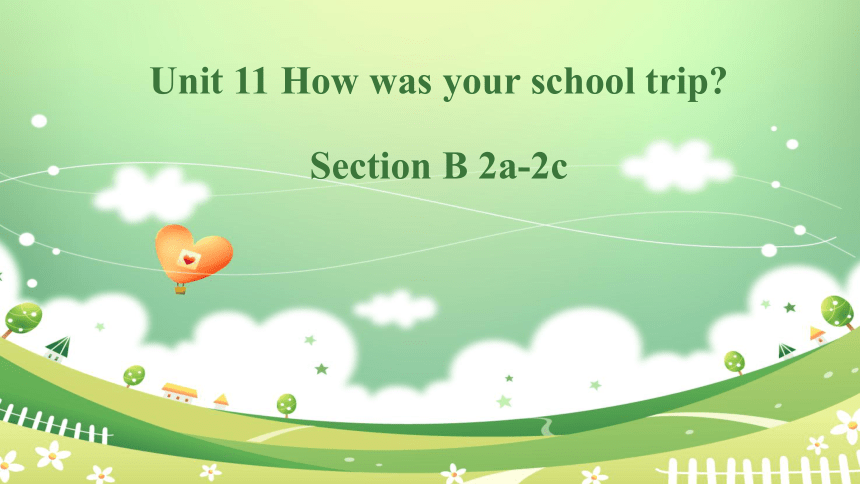 | |
| 格式 | zip | ||
| 文件大小 | 9.0MB | ||
| 资源类型 | 教案 | ||
| 版本资源 | 人教新目标(Go for it)版 | ||
| 科目 | 英语 | ||
| 更新时间 | 2023-04-14 10:28:43 | ||
图片预览

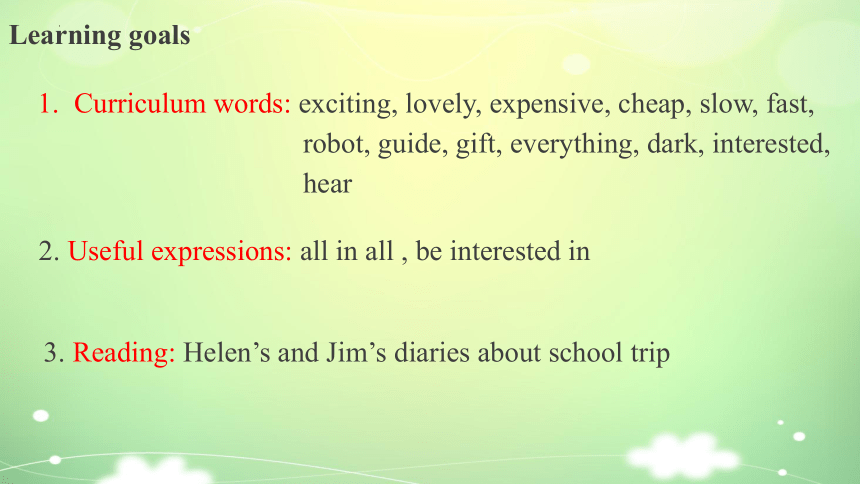
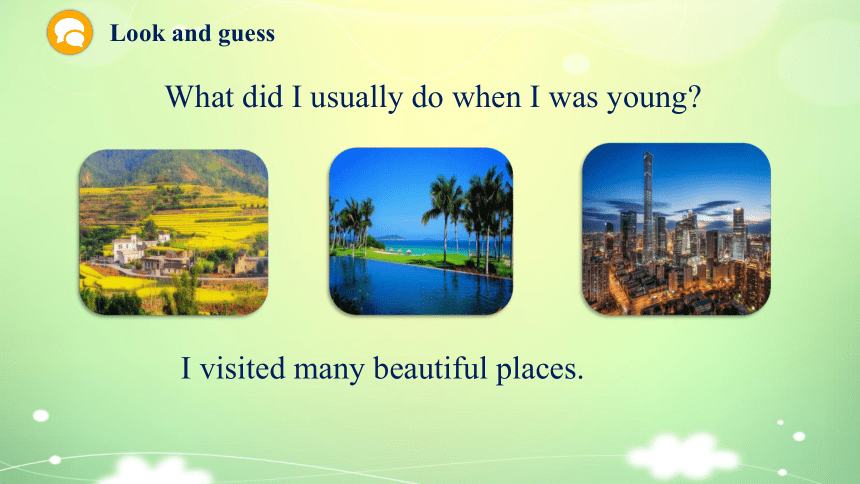
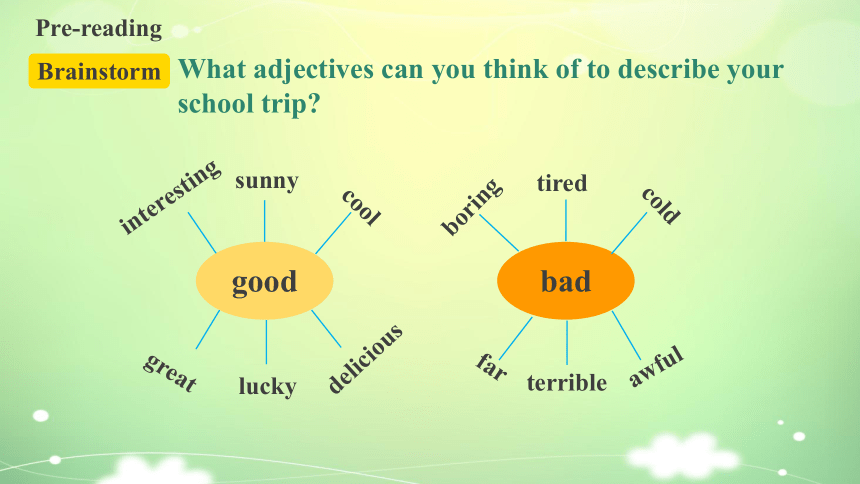
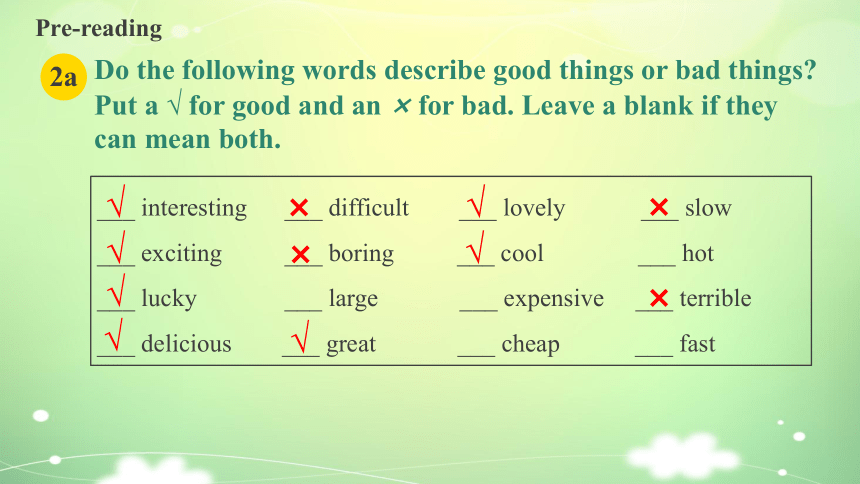
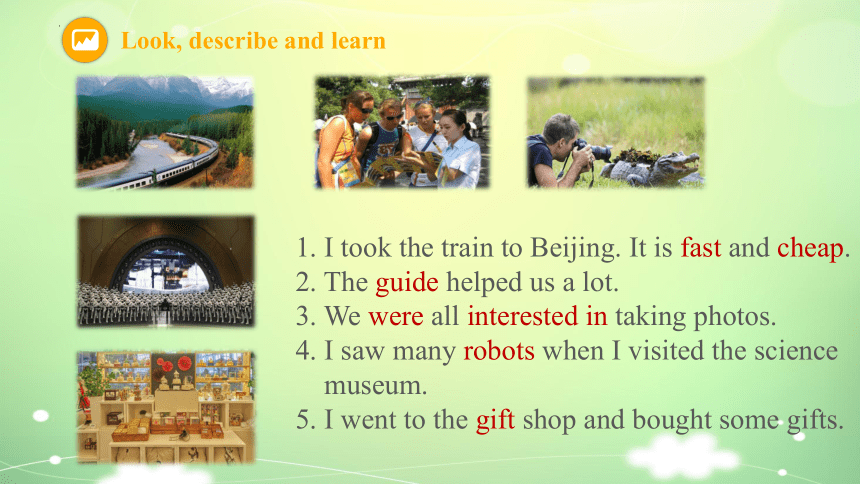
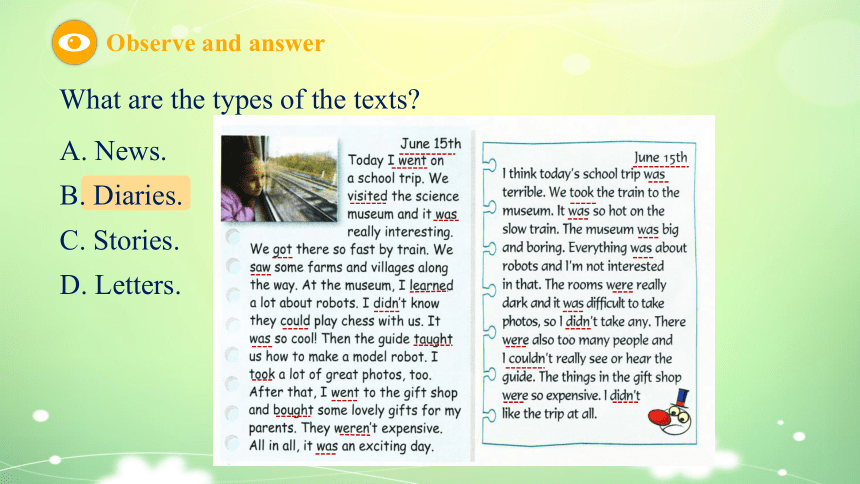
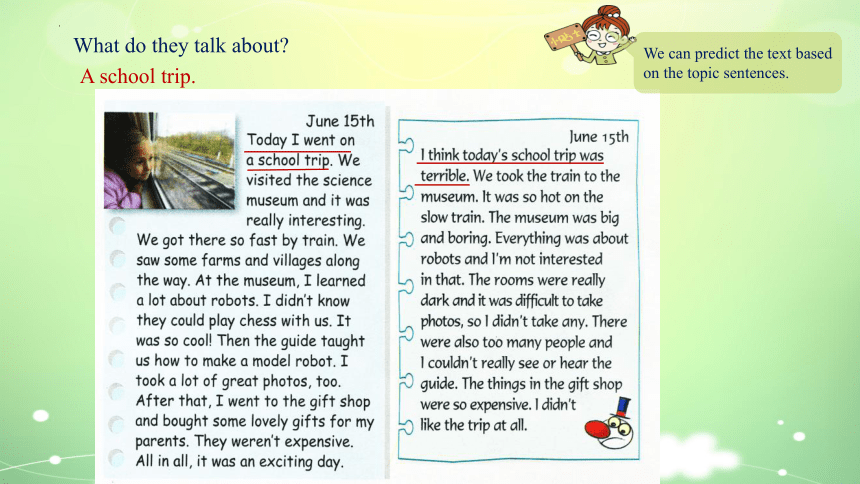
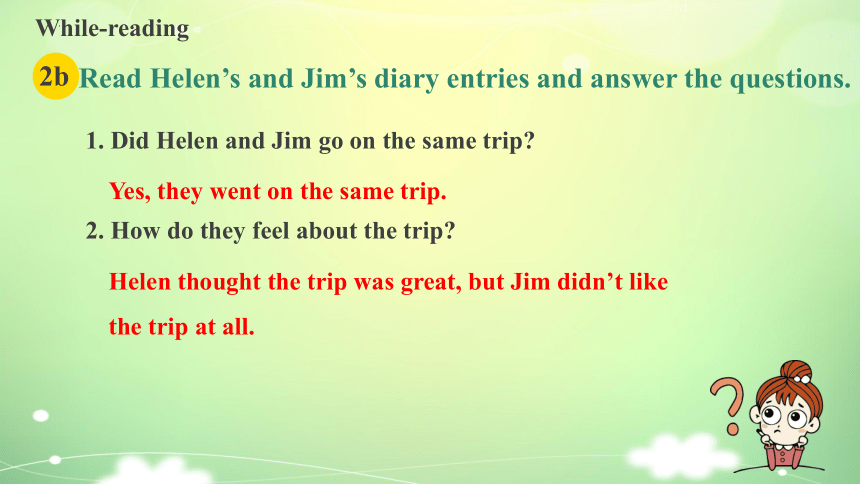
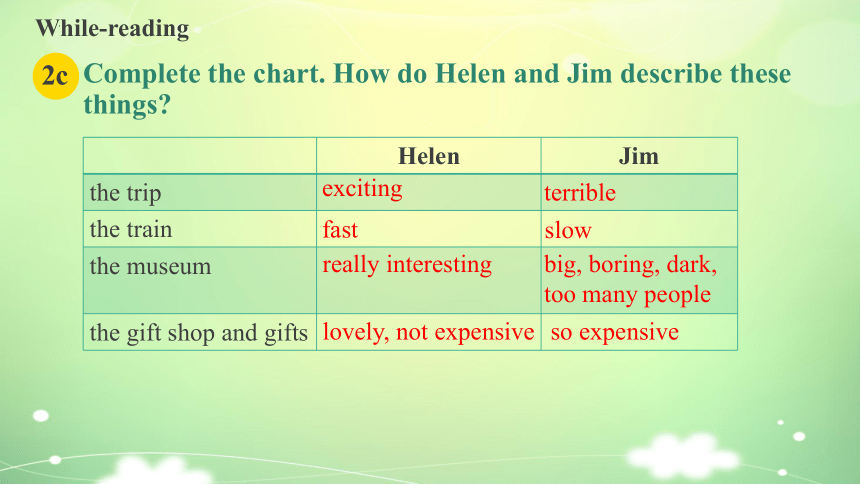
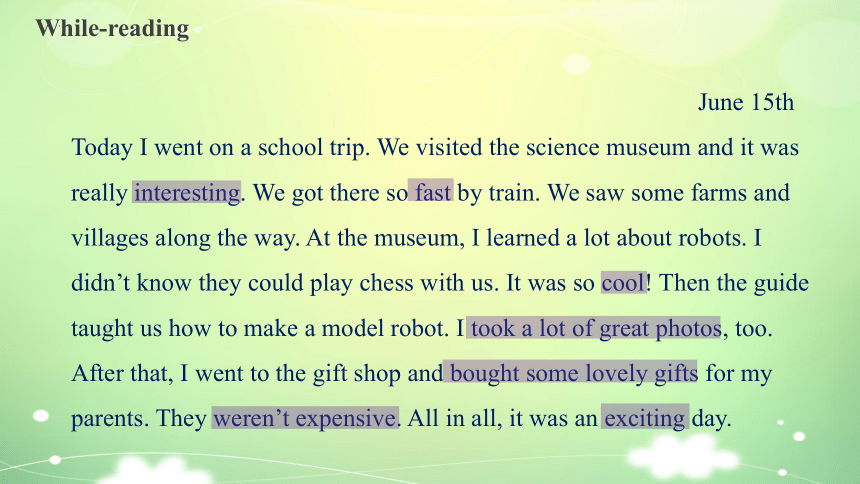
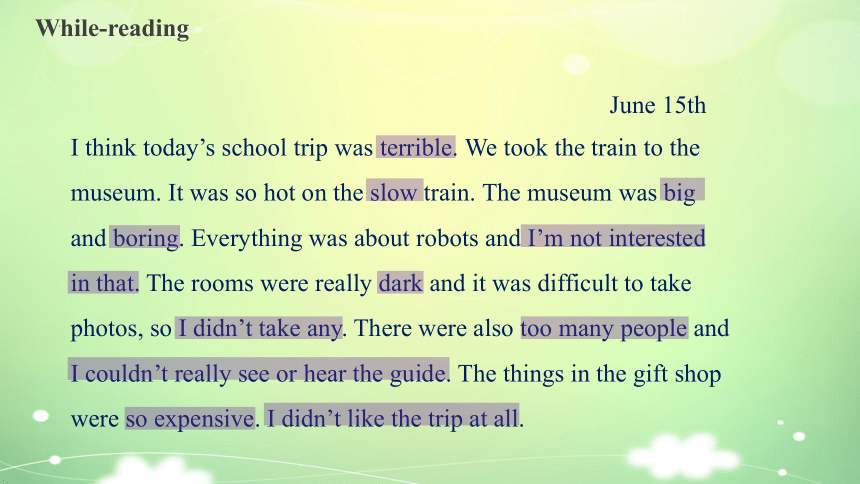
文档简介
(共41张PPT)
Unit 11 How was your school trip
Section B 2a-2c
Learning goals
Curriculum words: exciting, lovely, expensive, cheap, slow, fast,
robot, guide, gift, everything, dark, interested,
hear
2. Useful expressions: all in all , be interested in
3. Reading: Helen’s and Jim’s diaries about school trip
Look and guess
What did I usually do when I was young
I visited many beautiful places.
What adjectives can you think of to describe your school trip
Pre-reading
Brainstorm
good
bad
terrible
great
interesting
lucky
tired
delicious
far
boring
cool
sunny
cold
awful
Do the following words describe good things or bad things Put a √ for good and an × for bad. Leave a blank if they can mean both.
Pre-reading
2a
___ interesting ___ difficult ___ lovely ___ slow
___ exciting ___ boring ___ cool ___ hot
___ lucky ___ large ___ expensive ___ terrible
___ delicious ___ great ___ cheap ___ fast
√
×
√
√
√
√
√
√
×
×
×
Look, describe and learn
1. I took the train to Beijing. It is fast and cheap.
2. The guide helped us a lot.
3. We were all interested in taking photos.
4. I saw many robots when I visited the science
museum.
5. I went to the gift shop and bought some gifts.
A. News.
B. Diaries.
C. Stories.
D. Letters.
What are the types of the texts
Observe and answer
A school trip.
What do they talk about
We can predict the text based on the topic sentences.
Read Helen’s and Jim’s diary entries and answer the questions.
While-reading
2b
Yes, they went on the same trip.
Helen thought the trip was great, but Jim didn’t like
the trip at all.
1. Did Helen and Jim go on the same trip
2. How do they feel about the trip
Complete the chart. How do Helen and Jim describe these things
While-reading
2c
Helen Jim
the trip
the train
the museum
the gift shop and gifts
fast
exciting
really interesting
lovely, not expensive
terrible
so expensive
slow
big, boring, dark,
too many people
While-reading
June 15th
Today I went on a school trip. We visited the science museum and it was
really interesting. We got there so fast by train. We saw some farms and villages along the way. At the museum, I learned a lot about robots. I didn’t know they could play chess with us. It was so cool! Then the guide taught us how to make a model robot. I took a lot of great photos, too. After that, I went to the gift shop and bought some lovely gifts for my parents. They weren’t expensive. All in all, it was an exciting day.
While-reading
June 15th
I think today’s school trip was terrible. We took the train to the
museum. It was so hot on the slow train. The museum was big
and boring. Everything was about robots and I’m not interested
in that. The rooms were really dark and it was difficult to take
photos, so I didn’t take any. There were also too many people and
I couldn’t really see or hear the guide. The things in the gift shop
were so expensive. I didn’t like the trip at all.
Why did Helen and Jim have different opinions about the same trip
While-reading
Helen is interested in science and she loves
trip…
Jim doesn’t like robots, and he couldn’t take photos
at the museum…
The gifts were expensive…
Discussion
Read the two diary entries again and choose the best answer.
While-reading
What can we learn from the two diary entries
A. We should love school trips.
B. Traveling is good for our mind and body.
C. You should keep a diary when you are traveling.
D. Different people have different ideas about the same thing.
√
Read Helen’s diary entry, fill in the blanks and discuss.
Helen’s trip
Time
Place
June 15th
the science museum
took the train
saw __________________
________________
learned about robots
made _____________
took a lot of great photos
went to the gift shop
farms and villages
cool
a model robot
bought some gifts
lovely,
____________
not expensive
Transportation
Activities and feelings
Read Jim’s diary entry and fill in the blanks.
Time
Activities and feelings
June 15th
visited _____________
couldn’t __________ the guide
saw many robots
__________ photos
went to the gift shop
hot and slow
the museum
big, boring, dark
__________
____________
expensive
uninterested
didn’t take
see or hear
Jim’s trip
Place
the science museum
___________
Transportation
took the train
Listen and read Helen’s and Jim’s diary entries loudly.
Listen and read
Listen and read.
While-reading
June 15th
Today I went on a school trip. We visited the science museum and it was
really interesting. We got there so fast by train. We saw some farms and villages along the way. At the museum, I learned a lot about robots. I didn’t know they could play chess with us. It was so cool! Then the guide taught us how to make a model robot. I took a lot of great photos, too. After that, I went to the gift shop and bought some lovely gifts for my parents. They weren’t expensive. All in all, it was an exciting day.
go on a trip 参加旅行 相当于have a trip
robot / r b t/ n. 机器人
/k d/ can的过去式
/ga d/ n. 导游;向导
/t t/ teach的过去式
/g ft/ n. 礼物;赠品
/b t/ buy的过去式
总的来说
While-reading
June 15th
I think today’s school trip was terrible. We took the train to the museum.
It was so hot on the slow train. The museum was big and boring. Everything was about robots and I’m not interested in that. The rooms were really dark and it was difficult to take photos, so I didn’t take any. There were also too many people and I couldn’t really see or hear the guide. The things in the gift shop were so expensive. I didn’t like the trip at all.
/ evriθ / pron. 所有事物;一切
be interested/ ntr rst d/ in 对 …… 感兴趣
/dɑ (r)k/ adj. 黑暗的;昏暗的 反义词为bright “光明的;明亮的”
/h / v. 听到;听见
not at all 一点也不
Read the two diary entries again, then fill in the blanks.
Post-reading
Helen and Jim _____ a school trip on June 15th. They ______ a science museum. They went there by _____. At the museum, they _____ many robots. The robots _____ play chess with people. It _____ so cool. Helen _____ a lot of great photos, but Jim _____. They also went to the gift shop, Helen _____ some lovely gifts for her parents, but Jim thought the gifts were ________ and didn’t buy any.
had
visited
train
saw
could
was
took
didn’t
bought
expensive
If you are a reporter, you will interview Helen and Jim about their school trip.
Post-reading
Hi, Helen. Where did you go today
We visited the science museum.
How was your trip
It was...
How did you get there
We went there by...
...
...
Retell
big and boring
Trips
Helen’s trip
Jim’s trip
exciting
terrible
made a model robot
took photos;
went to the gift shop;
bought gifts
visited the science museum;
by train(fast);
saw farms and villages;
learn about robots;
took the train(slow);
museum was big and boring;
rooms are dark;
couldn’t take photos
too many people;
couldn’t see or hear the guide;
gifts were so expensive
What was your last trip/weekend like Talk about your feelings and the reasons.
Work in pairs and discuss
hot; sad
sunny
enjoy ice-cream;
happy
The trip/weekend was great/bad…
…
…
1. exciting adj. 使人兴奋的;令人激动的 (教材P65 2a)
Language points
Post-reading
exciting “使人兴奋的;令人激动的”,常用于修饰物,表示事物本身让人兴奋、激动。
excited “感到兴奋的”,常用于修饰人,表示人的主观感受。
We are excited at the exciting news. 我们因为那个激动人心的消息而激动万分。
语境串记
【易混辨析】exciting与excited
2. Then the guide taught us how to make a model robot. 然后,
导游教我们怎样制作机器人模型。(教材P65 2b)
Language points
Post-reading
【句式剖析】本句中how to make a model robot为“特殊疑问词 + 动词不定式”结构,在句中看作一个整体,作taught的直接宾语。
Then the guide taught us (how to make a model robot).
↓
teach sb. sth.结构
The guide explained the history of the Great Wall to us. 导游向我们讲解了长城的历史。
guide n.导游;向导
Point
Post-reading
【拓展延伸】(1)guide作名词,还可表示“指南;指导手册;旅游指南”。
Follow our step-by-step guide. 跟着我们的分步指南去做。
(2)guide还可作动词,意为“给某人领路;指引”。
He will guide you to the top of the mountain. 他将带领你们登上山顶。
The guide with a guide is guiding us trough
the forest. 那个拿着旅游指南的导游正领着我们穿越森林。
语境串记
Post-reading
Language points
3. All in all, it was an exciting day. 总的说来,这是令人兴奋的一天。 (教材P65 2b)
all in all 总的说来
Point
【用法详解】all in all常放在句首,用来对之前所说的内容进行归纳或总结。意义及用法类似的短语有:in a word(总之), in short(简而言之)。
All in all/In a word/In short, this is a good book. 总的说来,这是一本好书。
Post-reading
【拓展延伸】in all表示“总共;合计”,在句中的位置比较灵活。
There were twelve of us in all for dinner. 我们一共十二人吃饭。
That’s 50 dollars in all. 总计50美元。
4. Everything was about robots and I’m not interested in that. 一切
都是关于机器人的,我对那方面不感兴趣。 (教材P65 2b)
【用法详解】everything是不定代词,作主语时,谓语动词用第三人称单数形式。
Everything goes well. 一切进展顺利。
It’s very important to make a plan before we do everything. 我们在做所有事情之前先制订一个计划是非常重要的。
Language points
Post-reading
everything pron. 所有事物;一切
Point1
Post-reading
be interested in 对 …… 感兴趣
Point2
【用法详解】该结构中in为介词,其后接名词、代词或动词-ing形式作宾语。
He is interested in basketball. 他对篮球感兴趣。
Lisa is interested in singing and dancing. 莉萨对唱歌和跳舞感兴趣。
【拓展延伸】interest作名词,意为“兴趣;关注” ,have (an)
interest in sth. 表示“ 对......有兴趣”。
I have an interest in film music. 我对电影音乐感兴趣。
4. Everything was about robots and I’m not interested in that. 一切
都是关于机器人的,我对那方面不感兴趣。 (教材P65 2b)
Language points
【易混辨析】 interesting与interested
Post-reading
interesting 意为"有趣的", 表示事物的性 质特征。 This is an interesting story. 这是一个有趣的故事。
interested 意为"感兴趣 的",表示人的 主观感受。 He is interested in music. 他对音乐感兴趣。
5. There were also too many people and I couldn’t really see or hear
the guide. 而且人太多,我真的看不见导游,也听不清导游说什么。(教材P65 2b)
hear v. 听到;听见
Language points
Point
Post-reading
hear 及物动词 强调听的结果,其后直接接宾语。
listen 不及物动词 强调听的动作,其后跟宾语时要加介词to。
【易混辨析】hear与listen
I listened carefully, but heard nothing. 我仔细听了,但什么也没有听到。
Boys and girls, please listen to me. 同学们,请听我说。
6. I didn’t like the trip at all. 我一点儿都不喜欢这次旅行。(教材P65 2b)
not…at all 一点儿也不
Language points
Point
Post-reading
【用法详解】not…at all表示强烈的否定意味。
Tom doesn’t like dancing at all. 汤姆一点儿也不喜欢跳舞。
【拓展延伸】not at all的用法:
(1) 用来回答别人对你的感谢,意为“不客气,不用谢”。
—Thank you very much for lending me your bike. 非常感谢你借给我自行车。
—Not at all. 不客气。
Post-reading
(2) 用来回答别人的歉意,意为“没关系”。
—I’m sorry, Mom. I broke the glass. 对不起,妈妈。我打破了玻璃杯。
—Not at all. Be careful next time. 没关系。下次小心。
The coat is too e_______. I don’t have enough money.
It is very d______ in the room. I can’t see anything.
Didn’t you h______ what I said
I have a ______ (love) dog.
It was an _________ (excite) day.
Exercises
一、根据首字母提示或单词的正确形式完成句子
xpensive
1
2
3
4
5
ark
ear
exciting
lovely
二、单项选择
【2020·恩施州】There________ only a few things in the room, like a bed, some chairs and an old desk.
A. was B. were C. is
We had great fun visiting the farm. So, it was a(n) _____ trip.
A. tiring B. worrying C. exciting D. boring
【2020·孝感市】—Helen, could you please water the flowers in my garden
—___________.They are so lovely.
A. That's too bad B. With pleasure C. You're welcome D. I'm afraid not
B
C
B
1
2
3
Exercises
三、根据汉语意思完成句子(每空一词)
1
你对2022年北京冬奥会感兴趣吗?
the Beijing 2022 Winter Olympics
Are you interested in
2
总的说来,这是一本好书。
, this is a good book.
All in all
3
莉莉一点也不喜欢跳舞。
Lily like dancing .
doesn’t at all
【2020·襄阳市】我妹妹对地理感兴趣。(be)
My sister ________________________________ .
4
is interested in geography
Summary
Jim’s trip
interesting
感受Para.1
活动 Para.2
got there by train (fast); saw some farms and villages; learned a lot about robots; learned how to make a model robot; took a lot of photos; bought some lovely gifts
感受
terrible
took the train (hot, slow); not interested in robots; didn’t take any photos; couldn’t see or hear the guide
Helen’s trip
活动
the same trip
Summary
Unit 11 How was your school trip (Section B 2a-2c)
all in all , be interested in
Helen’s and Jim’s diaries about school trip
Expressions
Reading
New words
exciting, lovely, expensive, cheap, slow, fast,
robot, guide, gift, everything, dark, interested, hear
Homework
2. Finish the exercises in the workbook.
1. Retell the passage in 2b.
THANKS
Unit 11 How was your school trip
Section B 2a-2c
Learning goals
Curriculum words: exciting, lovely, expensive, cheap, slow, fast,
robot, guide, gift, everything, dark, interested,
hear
2. Useful expressions: all in all , be interested in
3. Reading: Helen’s and Jim’s diaries about school trip
Look and guess
What did I usually do when I was young
I visited many beautiful places.
What adjectives can you think of to describe your school trip
Pre-reading
Brainstorm
good
bad
terrible
great
interesting
lucky
tired
delicious
far
boring
cool
sunny
cold
awful
Do the following words describe good things or bad things Put a √ for good and an × for bad. Leave a blank if they can mean both.
Pre-reading
2a
___ interesting ___ difficult ___ lovely ___ slow
___ exciting ___ boring ___ cool ___ hot
___ lucky ___ large ___ expensive ___ terrible
___ delicious ___ great ___ cheap ___ fast
√
×
√
√
√
√
√
√
×
×
×
Look, describe and learn
1. I took the train to Beijing. It is fast and cheap.
2. The guide helped us a lot.
3. We were all interested in taking photos.
4. I saw many robots when I visited the science
museum.
5. I went to the gift shop and bought some gifts.
A. News.
B. Diaries.
C. Stories.
D. Letters.
What are the types of the texts
Observe and answer
A school trip.
What do they talk about
We can predict the text based on the topic sentences.
Read Helen’s and Jim’s diary entries and answer the questions.
While-reading
2b
Yes, they went on the same trip.
Helen thought the trip was great, but Jim didn’t like
the trip at all.
1. Did Helen and Jim go on the same trip
2. How do they feel about the trip
Complete the chart. How do Helen and Jim describe these things
While-reading
2c
Helen Jim
the trip
the train
the museum
the gift shop and gifts
fast
exciting
really interesting
lovely, not expensive
terrible
so expensive
slow
big, boring, dark,
too many people
While-reading
June 15th
Today I went on a school trip. We visited the science museum and it was
really interesting. We got there so fast by train. We saw some farms and villages along the way. At the museum, I learned a lot about robots. I didn’t know they could play chess with us. It was so cool! Then the guide taught us how to make a model robot. I took a lot of great photos, too. After that, I went to the gift shop and bought some lovely gifts for my parents. They weren’t expensive. All in all, it was an exciting day.
While-reading
June 15th
I think today’s school trip was terrible. We took the train to the
museum. It was so hot on the slow train. The museum was big
and boring. Everything was about robots and I’m not interested
in that. The rooms were really dark and it was difficult to take
photos, so I didn’t take any. There were also too many people and
I couldn’t really see or hear the guide. The things in the gift shop
were so expensive. I didn’t like the trip at all.
Why did Helen and Jim have different opinions about the same trip
While-reading
Helen is interested in science and she loves
trip…
Jim doesn’t like robots, and he couldn’t take photos
at the museum…
The gifts were expensive…
Discussion
Read the two diary entries again and choose the best answer.
While-reading
What can we learn from the two diary entries
A. We should love school trips.
B. Traveling is good for our mind and body.
C. You should keep a diary when you are traveling.
D. Different people have different ideas about the same thing.
√
Read Helen’s diary entry, fill in the blanks and discuss.
Helen’s trip
Time
Place
June 15th
the science museum
took the train
saw __________________
________________
learned about robots
made _____________
took a lot of great photos
went to the gift shop
farms and villages
cool
a model robot
bought some gifts
lovely,
____________
not expensive
Transportation
Activities and feelings
Read Jim’s diary entry and fill in the blanks.
Time
Activities and feelings
June 15th
visited _____________
couldn’t __________ the guide
saw many robots
__________ photos
went to the gift shop
hot and slow
the museum
big, boring, dark
__________
____________
expensive
uninterested
didn’t take
see or hear
Jim’s trip
Place
the science museum
___________
Transportation
took the train
Listen and read Helen’s and Jim’s diary entries loudly.
Listen and read
Listen and read.
While-reading
June 15th
Today I went on a school trip. We visited the science museum and it was
really interesting. We got there so fast by train. We saw some farms and villages along the way. At the museum, I learned a lot about robots. I didn’t know they could play chess with us. It was so cool! Then the guide taught us how to make a model robot. I took a lot of great photos, too. After that, I went to the gift shop and bought some lovely gifts for my parents. They weren’t expensive. All in all, it was an exciting day.
go on a trip 参加旅行 相当于have a trip
robot / r b t/ n. 机器人
/k d/ can的过去式
/ga d/ n. 导游;向导
/t t/ teach的过去式
/g ft/ n. 礼物;赠品
/b t/ buy的过去式
总的来说
While-reading
June 15th
I think today’s school trip was terrible. We took the train to the museum.
It was so hot on the slow train. The museum was big and boring. Everything was about robots and I’m not interested in that. The rooms were really dark and it was difficult to take photos, so I didn’t take any. There were also too many people and I couldn’t really see or hear the guide. The things in the gift shop were so expensive. I didn’t like the trip at all.
/ evriθ / pron. 所有事物;一切
be interested/ ntr rst d/ in 对 …… 感兴趣
/dɑ (r)k/ adj. 黑暗的;昏暗的 反义词为bright “光明的;明亮的”
/h / v. 听到;听见
not at all 一点也不
Read the two diary entries again, then fill in the blanks.
Post-reading
Helen and Jim _____ a school trip on June 15th. They ______ a science museum. They went there by _____. At the museum, they _____ many robots. The robots _____ play chess with people. It _____ so cool. Helen _____ a lot of great photos, but Jim _____. They also went to the gift shop, Helen _____ some lovely gifts for her parents, but Jim thought the gifts were ________ and didn’t buy any.
had
visited
train
saw
could
was
took
didn’t
bought
expensive
If you are a reporter, you will interview Helen and Jim about their school trip.
Post-reading
Hi, Helen. Where did you go today
We visited the science museum.
How was your trip
It was...
How did you get there
We went there by...
...
...
Retell
big and boring
Trips
Helen’s trip
Jim’s trip
exciting
terrible
made a model robot
took photos;
went to the gift shop;
bought gifts
visited the science museum;
by train(fast);
saw farms and villages;
learn about robots;
took the train(slow);
museum was big and boring;
rooms are dark;
couldn’t take photos
too many people;
couldn’t see or hear the guide;
gifts were so expensive
What was your last trip/weekend like Talk about your feelings and the reasons.
Work in pairs and discuss
hot; sad
sunny
enjoy ice-cream;
happy
The trip/weekend was great/bad…
…
…
1. exciting adj. 使人兴奋的;令人激动的 (教材P65 2a)
Language points
Post-reading
exciting “使人兴奋的;令人激动的”,常用于修饰物,表示事物本身让人兴奋、激动。
excited “感到兴奋的”,常用于修饰人,表示人的主观感受。
We are excited at the exciting news. 我们因为那个激动人心的消息而激动万分。
语境串记
【易混辨析】exciting与excited
2. Then the guide taught us how to make a model robot. 然后,
导游教我们怎样制作机器人模型。(教材P65 2b)
Language points
Post-reading
【句式剖析】本句中how to make a model robot为“特殊疑问词 + 动词不定式”结构,在句中看作一个整体,作taught的直接宾语。
Then the guide taught us (how to make a model robot).
↓
teach sb. sth.结构
The guide explained the history of the Great Wall to us. 导游向我们讲解了长城的历史。
guide n.导游;向导
Point
Post-reading
【拓展延伸】(1)guide作名词,还可表示“指南;指导手册;旅游指南”。
Follow our step-by-step guide. 跟着我们的分步指南去做。
(2)guide还可作动词,意为“给某人领路;指引”。
He will guide you to the top of the mountain. 他将带领你们登上山顶。
The guide with a guide is guiding us trough
the forest. 那个拿着旅游指南的导游正领着我们穿越森林。
语境串记
Post-reading
Language points
3. All in all, it was an exciting day. 总的说来,这是令人兴奋的一天。 (教材P65 2b)
all in all 总的说来
Point
【用法详解】all in all常放在句首,用来对之前所说的内容进行归纳或总结。意义及用法类似的短语有:in a word(总之), in short(简而言之)。
All in all/In a word/In short, this is a good book. 总的说来,这是一本好书。
Post-reading
【拓展延伸】in all表示“总共;合计”,在句中的位置比较灵活。
There were twelve of us in all for dinner. 我们一共十二人吃饭。
That’s 50 dollars in all. 总计50美元。
4. Everything was about robots and I’m not interested in that. 一切
都是关于机器人的,我对那方面不感兴趣。 (教材P65 2b)
【用法详解】everything是不定代词,作主语时,谓语动词用第三人称单数形式。
Everything goes well. 一切进展顺利。
It’s very important to make a plan before we do everything. 我们在做所有事情之前先制订一个计划是非常重要的。
Language points
Post-reading
everything pron. 所有事物;一切
Point1
Post-reading
be interested in 对 …… 感兴趣
Point2
【用法详解】该结构中in为介词,其后接名词、代词或动词-ing形式作宾语。
He is interested in basketball. 他对篮球感兴趣。
Lisa is interested in singing and dancing. 莉萨对唱歌和跳舞感兴趣。
【拓展延伸】interest作名词,意为“兴趣;关注” ,have (an)
interest in sth. 表示“ 对......有兴趣”。
I have an interest in film music. 我对电影音乐感兴趣。
4. Everything was about robots and I’m not interested in that. 一切
都是关于机器人的,我对那方面不感兴趣。 (教材P65 2b)
Language points
【易混辨析】 interesting与interested
Post-reading
interesting 意为"有趣的", 表示事物的性 质特征。 This is an interesting story. 这是一个有趣的故事。
interested 意为"感兴趣 的",表示人的 主观感受。 He is interested in music. 他对音乐感兴趣。
5. There were also too many people and I couldn’t really see or hear
the guide. 而且人太多,我真的看不见导游,也听不清导游说什么。(教材P65 2b)
hear v. 听到;听见
Language points
Point
Post-reading
hear 及物动词 强调听的结果,其后直接接宾语。
listen 不及物动词 强调听的动作,其后跟宾语时要加介词to。
【易混辨析】hear与listen
I listened carefully, but heard nothing. 我仔细听了,但什么也没有听到。
Boys and girls, please listen to me. 同学们,请听我说。
6. I didn’t like the trip at all. 我一点儿都不喜欢这次旅行。(教材P65 2b)
not…at all 一点儿也不
Language points
Point
Post-reading
【用法详解】not…at all表示强烈的否定意味。
Tom doesn’t like dancing at all. 汤姆一点儿也不喜欢跳舞。
【拓展延伸】not at all的用法:
(1) 用来回答别人对你的感谢,意为“不客气,不用谢”。
—Thank you very much for lending me your bike. 非常感谢你借给我自行车。
—Not at all. 不客气。
Post-reading
(2) 用来回答别人的歉意,意为“没关系”。
—I’m sorry, Mom. I broke the glass. 对不起,妈妈。我打破了玻璃杯。
—Not at all. Be careful next time. 没关系。下次小心。
The coat is too e_______. I don’t have enough money.
It is very d______ in the room. I can’t see anything.
Didn’t you h______ what I said
I have a ______ (love) dog.
It was an _________ (excite) day.
Exercises
一、根据首字母提示或单词的正确形式完成句子
xpensive
1
2
3
4
5
ark
ear
exciting
lovely
二、单项选择
【2020·恩施州】There________ only a few things in the room, like a bed, some chairs and an old desk.
A. was B. were C. is
We had great fun visiting the farm. So, it was a(n) _____ trip.
A. tiring B. worrying C. exciting D. boring
【2020·孝感市】—Helen, could you please water the flowers in my garden
—___________.They are so lovely.
A. That's too bad B. With pleasure C. You're welcome D. I'm afraid not
B
C
B
1
2
3
Exercises
三、根据汉语意思完成句子(每空一词)
1
你对2022年北京冬奥会感兴趣吗?
the Beijing 2022 Winter Olympics
Are you interested in
2
总的说来,这是一本好书。
, this is a good book.
All in all
3
莉莉一点也不喜欢跳舞。
Lily like dancing .
doesn’t at all
【2020·襄阳市】我妹妹对地理感兴趣。(be)
My sister ________________________________ .
4
is interested in geography
Summary
Jim’s trip
interesting
感受Para.1
活动 Para.2
got there by train (fast); saw some farms and villages; learned a lot about robots; learned how to make a model robot; took a lot of photos; bought some lovely gifts
感受
terrible
took the train (hot, slow); not interested in robots; didn’t take any photos; couldn’t see or hear the guide
Helen’s trip
活动
the same trip
Summary
Unit 11 How was your school trip (Section B 2a-2c)
all in all , be interested in
Helen’s and Jim’s diaries about school trip
Expressions
Reading
New words
exciting, lovely, expensive, cheap, slow, fast,
robot, guide, gift, everything, dark, interested, hear
Homework
2. Finish the exercises in the workbook.
1. Retell the passage in 2b.
THANKS
同课章节目录
- Unit 1 Can you play the guitar?
- Section A
- Section B
- Unit 2 What time do you go to school?
- Section A
- Section B
- Unit 3 How do you get to school?
- Section A
- Section B
- Unit 4 Don't eat in class.
- Section A
- Section B
- Unit 5 Why do you like pandas?
- Section A
- Section B
- Unit 6 I'm watching TV.
- Section A
- Section B
- Review of Units 1-6
- Unit 7 It's raining!
- Section A
- Section B
- Unit 8 Is there a post office near here?
- Section A
- Section B
- Unit 9 What does he look like?
- Section A
- Section B
- Unit 10 I'd like some noodles.
- Section A
- Section B
- Unit 11 How was your school trip?
- Section A
- Section B
- Unit 12 What did you do last weekend?
- Section A
- Section B
